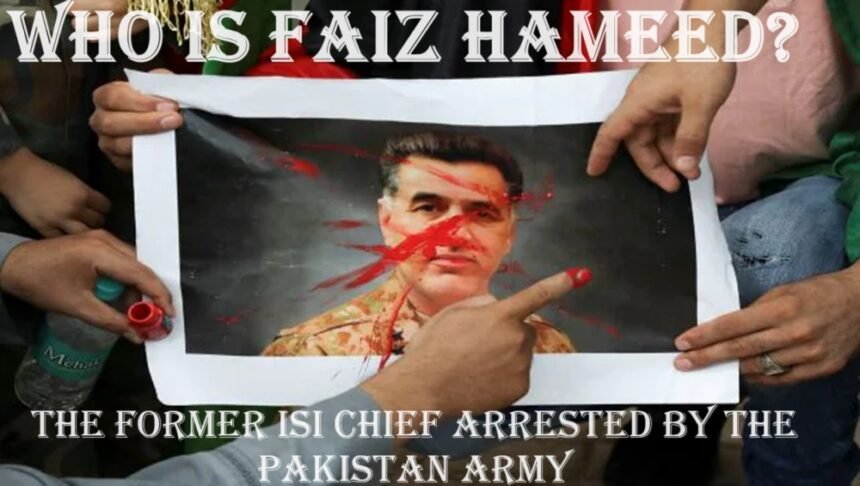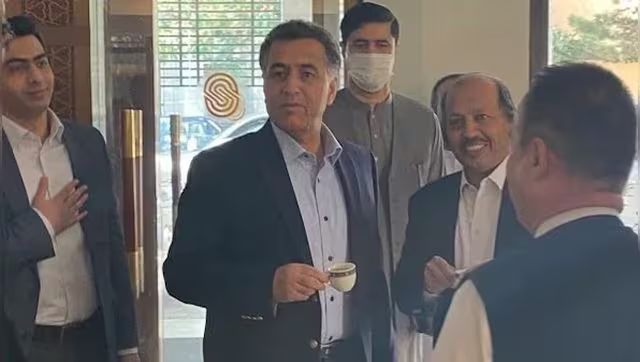Who is Faiz Hameed? The Former ISI Chief Arrested by the Pakistan Army
In a dramatic and unprecedented twist, the Pakistan Army has arrested Lt General Faiz Hameed, the former head of the Inter-Services Intelligence (ISI). This move has sent shockwaves through Pakistan’s political and military landscape, raising many questions about the reasons behind this bold action. Hameed, once a towering figure in Pakistan’s security apparatus, now finds himself at the center of a legal storm, facing charges that could reshape the future of military and political relations in the country.
The Arrest That Shook Pakistan
When news broke of Lt General Faiz Hameed’s arrest, it wasn’t just another headline—it was a seismic event. For the first time in Pakistan’s history, a former chief of the powerful ISI is facing court-martial proceedings. This is no small matter. The ISI is considered one of the most influential and secretive intelligence agencies in the world, and its chiefs are often seen as untouchable. So, what led to the downfall of such a high-ranking figure?
Hameed’s Rise to Power: A Brief Overview
Lt General Faiz Hameed was not just any officer in the Pakistan Army. His career trajectory saw him climbing the ranks to become the head of ISI from 2019 to 2021, during the tenure of then-Prime Minister Imran Khan. Hameed’s rise was swift and marked by his involvement in significant political and military events, making him one of the most recognized figures in Pakistan’s security landscape.
Before taking over the ISI, Hameed played a crucial role in resolving the Faizabad dharna in 2017, which was led by the Tehreek-i-Labbaik Pakistan (TLP). This event marked his emergence as a key player in Pakistan’s internal security. However, it was in 2021 when Hameed truly made international headlines, not for his actions within Pakistan, but for his meeting with the Taliban in Kabul’s Serena Hotel shortly after their takeover of Afghanistan. The images of him sipping tea with Taliban leaders symbolized Pakistan’s complex relationship with the group, especially during a time when global powers were still grappling with the fallout of the U.S. withdrawal from Afghanistan.
A Controversial Figure in Pakistan’s Political Arena
Throughout his career, Hameed was never far from controversy. Many politicians accused him of using his position to further his political ambitions, often at the expense of democratic institutions. Former Prime Minister Nawaz Sharif openly accused Hameed of conspiring with certain Supreme Court judges and military officials to orchestrate his removal from power in 2017. These allegations added to Hameed’s already controversial reputation, painting him as a figure who was willing to go to great lengths to secure his position in the power corridors of Pakistan.
The Top City Scandal: The Beginning of the End
So, what exactly led to Hameed’s arrest? The answer lies in a housing scheme scandal known as the Top City case. The controversy began when Moeez Ahmed Khan, the owner of the Top City housing development, filed a petition in Pakistan’s Supreme Court, accusing Hameed of using his position to raid his office and residence. Khan claim that valuables, including gold, diamonds, and cash, were seized during these raids and that Hameed had extort approximately Rs 4 crore from him. These allegations were serious enough to prompt Pakistan’s Supreme Court to order an investigation by the Ministry of Defence.
The court noted that the allegations against Hameed were of an “extremely serious nature” and could not be ignor. If proven true, they would not only tarnish Hameed’s reputation but also undermine the integrity of Pakistan’s federal government, armed forces, and intelligence agencies.
Military Response and the Court Martial
In response to these damning allegations, the Pakistan Army formed a committee to investigate Hameed’s actions. The investigation culminated in the decision to arrest Hameed and initiate court-martial proceedings against him. According to a statement from the Inter-Services Public Relations (ISPR), Hameed was found to have violate the terms of his retirement from the arm forces, and additional charges were brought against him relate to his involvement in the Top City scandal.
The ISPR statement further note that multiple instances of post-retirement violations of the Pakistan Army Act were establish against Hameed, leading to the initiation of a Field General Court Martial. This marked the first time in Pakistan’s history that a former ISI chief faced such severe legal consequences, signaling a significant shift in the military’s approach to accountability.
Hameed and Imran Khan: Allies or Adversaries?
Hameed’s arrest has also spark speculation about its implications for former Prime Minister Imran Khan, who is currently imprison. The two were known to close allies during their time in power, with many believing that Hameed play a key role in supporting Khan’s political strategies. Even after Hameed’s retirement, rumors persist that he continue to advise Khan, fueling the perception that their alliance remain strong.
For some, Hameed’s arrest is seen as a direct warning to Khan and his supporters. The military’s message appears clear: no one, not even a former ISI chief or a former Prime Minister, is above the law. This crackdown on one of Khan’s closest allies suggests that the military is intent on reasserting its authority and curbing any attempts to challenge its dominance.
The Al-Qadir Trust Case: Another Scandal in the Mix
Adding to Hameed’s woes is his alleged involvement in another high-profile scandal—the Al-Qadir Trust case. In May 2023, Pakistan’s former minister Faisal Vawda accused Hameed of being the “architect, mastermind, and biggest beneficiary” of this case. The allegations revolve around claims that Imran Khan and his wife illegally acquired billions of Pakistani Rupees and land from Bahria Town Ltd. Vawda’s accusations only served to further tarnish Hameed’s reputation, casting him as a figure deeply entangled in corrupt practices.
A Warning to the Military: The Broader Implications of Hameed’s Arrest
Hameed’s arrest is not just about one man’s fall from grace; it carries broader implications for Pakistan’s military and political landscape. Husain Haqqani, a former Pakistani ambassador to the United States, noted that the arrest and potential trial of a former ISI chief is highly unusual for Pakistan. This move could signify a shift in how the military handles internal dissent and accountability, particularly in a time when public sentiment against the military is on the rise.
Michael Kugelman, a fellow at the Wilson Centre in Washington, D.C., observed that the military might be using Hameed as an example to demonstrate its commitment to accountability, even when it involves its own high-ranking officers. By taking such a bold step, the military aims to reinforce its authority and reassure the public that it is serious about maintaining discipline within its ranks.
A Clear Message from General Syed Asim Munir
For many, Hameed’s arrest is also a message from the current Pakistan Army Chief, General Syed Asim Munir. Munir, who succeed Hameed as ISI chief and later as Army Chief, has made it clear that any attempts to weaken or divide the military will not tolerat. This crackdown on Hameed can seen as part of Munir’s broader strategy to consolidate his power and ensure that the military remains united in the face of internal and external challenges.
Murtaza Solangi, a former information minister and political analyst, emphasiz that the arrest is aim at sending a strong signal to both serving and retir military personnel. The message is unequivocal: any actions that undermine the military’s cohesion or authority will met with severe consequences.
The Road Ahead: What’s Next for Faiz Hameed?
As Faiz Hameed faces court-martial proceedings, the outcome of his case remains uncertain. Will he found guilty and face the full weight of the law? Or will he manage to navigate the complex legal and political landscape of Pakistan to avoid serious punishment? Whatever the outcome, Hameed’s case will likely set a precedent for how the military deals with high-ranking officers accused of wrongdoing in the future.
For Imran Khan and his supporters, Hameed’s arrest serves as a stark reminder of the challenges they face in their political struggle. The military’s willingness to take down one of its own to maintain its authority sends a clear signal that it will not tolerate any attempts to challenge its power.
Conclusion
The arrest of Lt General Faiz Hameed is a watershed moment in Pakistan’s history. It marks the first time a former ISI chief has subjected to court-martial proceedings, highlighting the military’s resolve to maintain discipline and accountability within its ranks. Hameed’s downfall, root in allegations of corruption and misuse of power, serves as a cautionary tale for others who might be tempt to use their positions for personal gain. As the case unfolds, it will undoubtedly shape the future of military and political relations in Pakistan, with far-reaching implications for the country’s stability and governance.
Final Thought
In the intricate dance of power and politics in Pakistan, Faiz Hameed’s arrest is a reminder that even the most powerful figures can fall. The military’s decision to arrest and court-martial one of its own sends a powerful message: accountability knows no rank. As Pakistan watches this unprecedented case unfold, the implications for the country’s future remain uncertain, but one thing is clear—no one is untouchable.










